English Words in Action, Group D
(a variety of English words which have developed through history and are currently used in our modern age)
Simply click on this banner (or the following link) and you will be on your way to stimulate your brain for greater word comprehension with quizzes based on some of the words in this unit.
Shirley delved into her handbag in search of a pen to write her friend's address and telephone number in her address book.
2. To dig into the ground; especially with a shovel or spade: Greg had hopes of finding his lost house keys in his garden, so he delved into it with a rake and finally found what he was looking for!3. To search deeply or to investigate arduously into something: Joanna was very interested in her family history, so she delved into all the past records and photos that her mother could find for her to examine.
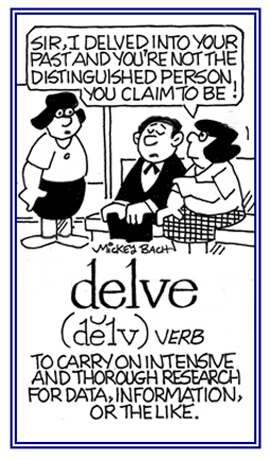
Go to this Word A Day Revisited Index
so you can see more of Mickey Bach's cartoons.
Ed and Jillian were a couple of "liberal-progressive" diehards who could only condemn conservatism.
Dina's father was a diehard Republican and her mother was a diehard Democrat and neither one could agree on what should be done politically.
2. An amateur who engages in an activity without serious intentions and who pretends to have knowledge: You can always tell the difference between a true expert and a scientist who is a dilettante.
3. A person who shows frivolous or superficial interest: As a salesman, Erwin was still a dilettante because he really was not interested in that kind of work.
4. Etymology: from Italian, "lover of the arts", from present participle of dilettare, "to delight"; from Latin delectare, "to allure, to delight".
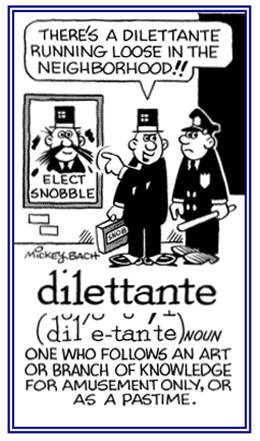
Go to this Word A Day Revisited Index
so you can see more of Mickey Bach's cartoons.
2. To confuse or to disconcert; to upset; to frustrate: The politician was completely discombobulated by the critics in the audience.
3. Etymology: from 1834, American English, a fanciful coinage of a type popular then (originally discombobricate).
Possibly an alteration of or a play on the words discompose, discomposure, etc., "a loss of the ability to remain calm and self-assured; especially, under difficult or emotional circumstances".
2. Having a feeling of embarrassment that leaves a person confused and bewildered; especially, as a result of several conflicting situations, objects, or statements: Mary's complete discombobulation was evident when she was called to the front of the auditorium to receive an unexpected award.
The noises made by the students in the classroom were disgruntling the teacher.
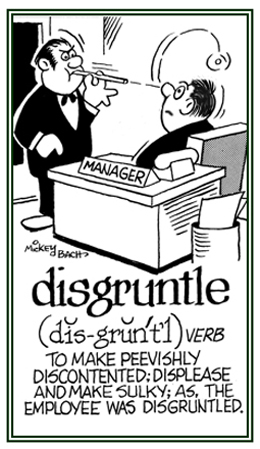
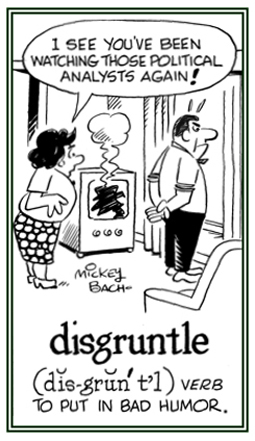
Go to this Word A Day Revisited Index
so you can see more of Mickey Bach's cartoons.
2. To change the usual appearance, sound, etc. of a person or or something: Glenda disguised herself as a musician so she could get into the concert hall early.
3. To hide something so it will not be noticed nor recognized: The workers disguised their happiness when the rain kept them from working on the building for over an hour as they played cards in a shelter.
While driving on a road one evening, the driver fell asleep and drove his car into a ditch.
2. A long narrow cut made in the earth to bury a pipeline, a power line, or similar emplacement: The summer hires were assigned by the electric company to dig a ditch for the new cable installation.3. Any open passage or trench, used as a natural channel or waterway: The Suez Canal is an example of a man-made ditch of major importance.
4. Etymology: from Old English dic, "moat, ditch", which later gave English dike.
The thief was seen ditching the purse he had just stolen into a trash container.
2. To end a relationship with someone: Denis ditched Mildred who was his girlfriend.The owner of the baseball team ditched the head coach.
3. U.S. informal, to not go to something; such as, school, work, etc.: Kermit ditched school so he could join the military service.Shanna ditched work today because she wanted to do something else.
4. To land an aircraft on water or land because of an emergency situation: When the engine of the plane stopped working, the pilot was forced to ditch it in a nearby channel and fortunately, no one was injured.2. A famous and successful woman who is considered very attractive: Erin is a fashion diva who appears on TV quite often wearing new styles of dresses.
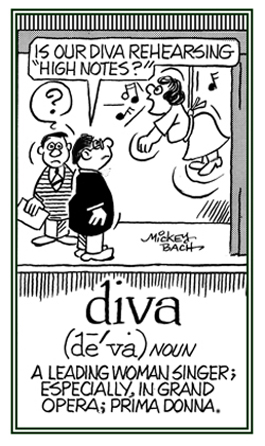
Go to this Word A Day Revisited Index
so you can see more of Mickey Bach's cartoons.
2. Yielding to supervision, direction, or management; tractable: Trudy's co-workers turned out to be a very docile group with whom to work.
3. Amenable to training or handling; easily managed; obedient and non-resistive: Jennifer had a docile, well-behaved pet.
When a child becomes unusually pliant, obedient, manageable, and excessively subservient, he or she may, in short, become docile.
Docile people sometimes wonder why they are not more popular; after all, they never make any trouble for anyone.
Other people usually find nothing admirable or necessarily likable about a docile person who is willing to be pushed around, or who does what she or he is told out of fear of offending others.
It's considered a poor upbringing when parents don't allow a docile youngster some room for self-expression, and for the release of tension and hostility.
4. Etymology: "easily taught", from Italian or French docile, from Latin docilis, "easily taught" and so, "easily managed".Links to all of the groups of English words in action, Groups A to Z.
You may see the bibliographic list of sources of information for these words in action.


